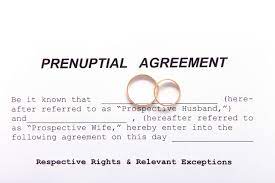Are prenups legal in Spain? What happens if you don’t sign a prenup?
Marriage can be described as a contract between two partners. Should this contract ever be dissolved, a prenuptial agreement, short: prenup, can make the separation and divorce process both easier and less painful. Unfortunately, a lot of couples shy away from this topic as it can be an uncomfortable and difficult conversation. Ironically these couples might happen to have even more inconvenient conversations during the process of separation and divorce.
What does “prenup” mean?
A prenup is defined as a written contract between two people before they commit to marriage. It usually covers issues such as support payments like settlements and alimony, how to split finances, how to divvy up the house, who gets to retain possession of certain items, how long one partner/children can reside in the home after divorce, inheritance for children from previous commitments and what happens if one partner becomes unfaithful.
For a valid and effective prenup, there needs to be a separate attorney for each party as well as there is no oral prenup so that every detail must be written down in recordable format. The lawyers ensure that the prenup is executed voluntarily and that it is fair, as any lopsidedness can lead to invalidation. Besides, prenups are not enforceable in Spain if they are detrimental to the children or seriously damaging to one of the spouses, Art. 90 CC.
What happens if you don’t sign a prenup?
If you do not sign a prenup, the distribution of property after divorce is carried out according to state law. According to the Civil Code of Spain divorce or separation terminates the community of acquisitions, followed by the dissolution and liquidation of the joint property, Art. 1392 CC. If it leads to an economic imbalance to the detriment of one of the two spouses, the disadvantaged one is entitled to a compensatory payment which may consist of alimony for a limited or unlimited period, or a one-time payment to be determined by the judge in the absence of a prenuptial agreement, Art. 97 CC. Under certain circumstances, the right to alimony can also be lost, Art. 101 CC. Personal assets that cannot be divided because they belong to their owners are excluded from division and listed in Art. 1346 CC. The family residence, although excluded from property division if it belongs to only one of the spouses, may nevertheless be awarded by the court to the other spouse if he or she depends on the continued use of the family residence to secure his or her necessities of life or if a child has a fundamental need for continued use of it, Art. 96 CC. The debts of the community are satisfied from the community money or assets, Art. 1399-1400 CC.
Summing up in can be said that a prenup accounts for the changes you cannot foresee or anticipate, as it is better to already have an umbrella when it starts raining. It takes the emotion out of the proceedings since during divorce both parties may not always be on speaking terms, it facilitates important discussions and ensures your finances are handled the way you intend, during and after marriage. The absence of a prenup can put people in a financially unmanageable positions, while signing a prenup establishes the exact financial situation of both parties after separation. A prenup does not mean you don’t trust your partner. It means you are invested in long-term success.
Written in collaboration with Natalie Efiamarho




